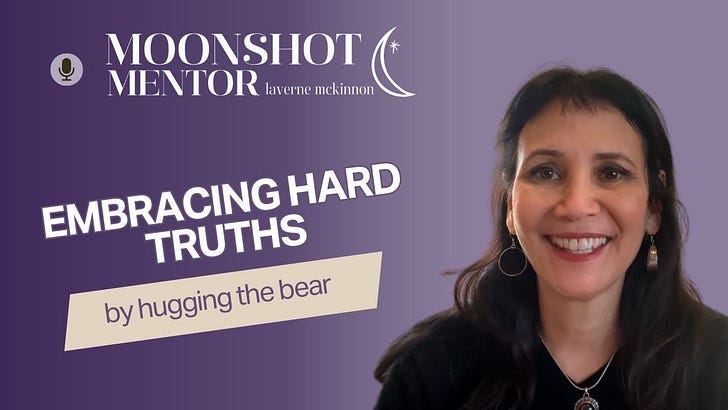Have you ever noticed how, in the wake of career disappointment, your inner voice turns cruel?
Maybe you got laid off, a big project didn’t pan out, or someone else landed the role you were hoping for. And suddenly, instead of processing the loss, your brain goes on the attack:
"I’m not good enough."
"I’m a failure."
"I’ll never recover from this."
"I should have seen this coming—it’s my fault."
It’s like there’s a relentless critic living inside your head, ready to tear you down at the first sign of trouble.

But here’s the thing: This self-judgment isn’t just negative thinking. It’s a response to grief. When we experience professional heartbreak, we don’t just mourn the job, project, or opportunity—we start questioning our worth. And that’s where the gremlins thrive.
Why Does Career Grief Invite Self-Doubt?
From the time we’re kids, we’re asked, “What do you want to be when you grow up?” Not who we want to be—what. The question isn’t about our values, relationships, or the kind of life we hope to build. It’s about our job. And that messaging doesn’t stop in childhood.
As adults, one of the first things we ask when meeting someone new is, “What do you do?” Our jobs become shorthand for who we are, a way to signal status, competence, and belonging. In Western society, work isn’t just about earning money—it’s how we’re defined.
So when we experience career grief—whether through job loss, a major setback, or a stalled opportunity—it’s not just a professional disruption. It’s an identity disruption.
It’s no wonder self-doubt creeps in. If your work is tied to your sense of self, then when something goes wrong, it can feel like you are what’s broken. It’s not just that you lost a job; it’s that maybe you weren’t good enough to keep it. It’s not just that a project didn’t move forward; it’s that maybe you don’t have what it takes to make it happen.
But here’s what I’ve learned working with clients: The story our “gremlins” tell us is rarely the full story.
Let's delve into the concept of "gremlins"—those nagging voices of negative self-talk—and explore how they influence our emotions, especially during career setbacks.

What Are "Gremlins"?
In the context of our inner dialogue, "gremlins" refer to the critical, often harsh thoughts that undermine our self-esteem and confidence. This negative self-talk manifests as an internal monologue that is pessimistic or self-defeating.
Research reported by Psychology Today indicates that the average person has between 12,000 to 60,000 thoughts per day, with up to 80% of these being negative. A lot of us are battling these gremlins more often than we realize.
How Thoughts Influence Feelings
Our thoughts have a profound impact on our emotions. Essentially, thoughts can trigger emotions; for instance, worrying about an upcoming job interview may create an opening for negative self talk like “Why am I even trying this job? I’m no good.”
When "gremlins" flood our minds with negative thoughts—like "I'm a failure" or "I can't do anything right"—they elicit feelings of sadness, anxiety, or hopelessness. This is why career grief can hit so hard—it’s not just what happened, but the way our thoughts shape how we feel about it.
Data Over Drama
When career heartbreak hits, I encourage my clients to step back and look at the facts as a way to get around the gremlin voices.
Ask yourself:
What actually happened? Strip away emotion for a moment and get clear on the events.
What was in my control? Were there decisions you made that contributed?
Where do I need to take responsibility? This is different from blame. Responsibility is about learning, not punishing yourself.
What was not in my control? This is where most people realize they weren't 100% responsible. Maybe leadership changed direction. Maybe the company was struggling. Maybe the opportunity wasn't the right fit after all.
No one I've coached has ever been solely responsible for their career setback. Not once. They may have played a part, but the situation is always more nuanced than their gremlins would have them believe.
By looking at the facts instead of letting negative self-talk take over, you can see the situation more clearly and respond in a way that actually helps you move forward.
Bottom Line
Your gremlins aren’t going to disappear overnight, but calling them out is the first step. When you understand how your thoughts shape your feelings and focus on the facts instead of the worst-case stories in your head, you can start shifting your mindset. That’s what helps you move forward—not beating yourself up, but seeing the situation for what it really is.
Before You Go …
I want to invite you to a very special workshop for paid Substack subscribers. It’s called the Career Grief Compass and over five live Zoom sessions, we’ll move through the emotional and practical sides of career grief together:
✅ Why grief needs ritual—even in professional life—and how it helps us mark transitions we never planned for
✅ Creative, symbolic ways to honor and release what you’ve lost, so you’re not carrying it silently anymore
✅ How grief impacts the brain—and how small rituals and reflection can rewire us toward healing
✅ Tools to reframe your story and find meaning in what happened, without rushing to “silver linings”
✅ A action plan to move forward—rooted in agency, not urgency
You’ll leave with language for what you’ve been feeling, practices to ease the emotional weight, and a renewed sense of direction.
Friends, this work is deeply personal for me. When I was fired from a job I loved, I carried the weight of that experience for over a decade. At the time, I didn’t have the language for what I was feeling. It wasn’t just disappointment—it was grief. But because no one around me talked about it that way, I internalized the loss as personal failure. That experience shaped how I now support others through similar heartbreak.
This workshop is the kind of resource I wish I had back then.
We begin Tuesday, April 29, and meet every other Tuesday through June 24.
This series is free for paid Moonshot Mentor Substack subscribers. A subscription is $5/month or $50/year, and it helps keep these offerings accessible and sustainable. And if finances are tight right now—DM me. No questions asked. You’re still welcome.
Paid subscribers also receive ongoing support through:
✨ Two monthly co-working Zoom sessions for accountability and momentum
🧘♀️ Exclusive guided meditations to ground you during transitions
📓 Curated journal prompts to deepen self-awareness and resilience
👥 A private community of thoughtful professionals navigating what’s next
If you're ready to process career grief in a more intentional way, I’d love to have you join us.
Journal Prompts:
Your gremlins love to tell one-sided stories—ones that make you feel small, stuck, and powerless. These journal prompts will help you challenge your gremlins, separate feelings from reality, and reframe your narrative in a way that moves you forward. Grab a notebook and take your time—this is about reflection, not perfection.
Listen to this episode with a 7-day free trial
Subscribe to Moonshot Mentor with Laverne McKinnon to listen to this post and get 7 days of free access to the full post archives.












